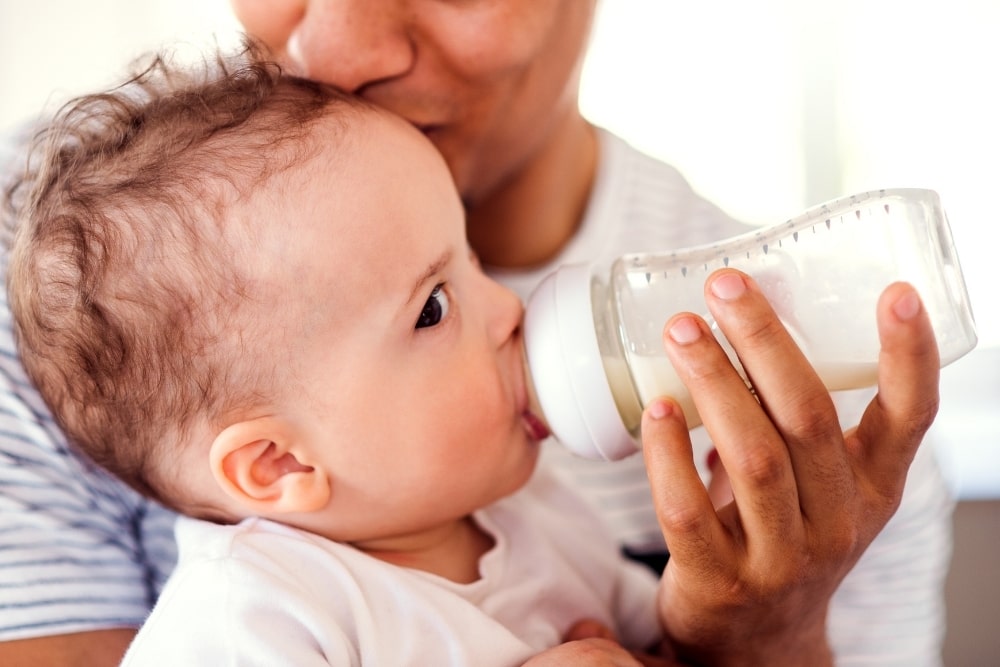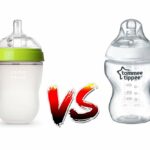If your baby is spitting up formula but seems perfectly fine when you breastfeed them, it can be concerning. However, this is extremely common. Spitting up in babies is equally common.
There is more than likely nothing serious wrong with your baby. However, that doesn’t mean that you want them spitting up, either. These tips and tricks will help you figure out why it’s happening and what to do about it.
First, Make Sure It’s The Formula
While it might seem like your baby is only spitting up the formula, that isn’t always the case. There’s a chance that your baby is having stomach trouble for another reason.
To determine whether that is the case, document when your baby spits up and when they eat formula or breastmilk. You might find that your little one only spits up during the day, which just so happens to be while you’re at work.
This could be because the person feeding them is overfeeding them, they don’t get burped, or for another reason.
Common Reasons Why My Baby Is Spitting Up
If you find that your baby is spitting up, it’s important to figure out why. There are so many things that can make your baby spit-up. You want to make sure that it is, in fact, the formula that is giving them an upset stomach.
Overfeeding Your Baby
It’s surprisingly easy to overfeed your little one. Most babies will give cues that they are done eating, such as refusing to eat or crying when they eat. However, some babies don’t give those same cues. This can lead to assuming that the baby is still hungry because they are still drinking the bottle.
In addition to that, some babies will drink a bottle even if they aren’t hungry. Sucking on something is soothing to infants. That means that a baby will eat if they are tired, hungry, etc. as well. If they aren’t hungry and still eat, they are being overfed.
Lastly, it can be hard to tell whether a baby is full if they are breastfed and then fed a bottle to supplement. That’s because you can’t tell how much breastmilk they drank before they started on the bottle.
To avoid this, consider only giving breastmilk or a bottle per feeding. You can also pump breastmilk to make it easier to determine how much you’re feeding your baby.
View in gallery
Symptoms Of Overfeeding Baby
If you are accidentally overfeeding your little one, there are a few ways to tell. One of the most common symptoms of a baby being overfed is that they will cry when eating. It’s because their stomach is full and starting to hurt. Other signs to watch for include:
- Gas
- Vomiting after eating
- Fussy and crying after eating
- Gagging and/or choking
- Burping more than usual
- Frequent spit-up
If your baby shows these signs, take a good look at how much you’re feeding your baby.
How Much Should You Feed Your Baby?
In general, babies will eat approximately 2.5 ounces of formula per day for every pound that they weigh. That means that a baby that weighs ten pounds will eat twenty-five ounces per day. Keep in mind that this is an estimate. Some babies will eat a little more or a little less.
Overstimulation
When babies are done eating, bouncing them too much can make them throw up. This is even common in older children! My littlest was like this at three years old. Pay attention to what is happening after your baby is done eating to determine whether this is the cause of the spit-up.
After your baby is done eating, avoid tummy time or activities that result in a lot of movement for half an hour. Don’t bounce the baby on your knee or throw them up in the air. Instead, enjoy some quiet cuddle time or read them a story.
Gas
If your baby doesn’t burp when they are being fed, it can cause gas. Some babies are naturally gassy. Unfortunately, all of the extra air in your little one’s stomach can make them spit-up.
Signs Of Gas In A Baby
Most babies that have gas have certain symptoms. This is because gas makes their stomach hurt. For example, you might notice your baby pulling their knees up their chest while crying. Other symptoms of gas include:
- Your baby gets red in the face as though they are in pain
- Your little one seems unhappy
- Problems eating
- Difficulty sleeping
- Your baby settles down after passing gas
If your baby has gas, treating the gas can help reduce the amount of spit-up that you see from your baby.
How To Treat Gas In Babies
[amalinkspro type=”showcase” asin=”B086F46BZW” apilink=”https://www.amazon.com/dp/B086F46BZW?tag=mominformedcom-20&linkCode=osi&th=1&psc=1″ new-window=”true” addtocart=”false” nofollow=”true” sc-id=”4″ img-sizes=”500:500″ imgs=”https://m.media-amazon.com/images/I/61YpHkOvCkL._SL500_.jpg” link-imgs=”false” specs=”Gently relieves stomach discomfort from gas, colic, fussiness, and hiccups~~~This statement has not been evaluated by the Food and Drug Administration (FDA); This product is not intended to diagnose, treat, cure or prevent any disease~~~Safe for newborns~~~Gently works in minutes to relieve pain from excess gas~~~Pediatrician Recommended; safe for newborns~~~Safe for use at every feeding or up to 12 doses a day” btn-color=”#ff9900″ btn-text=”Check Price” alignment=”aligncenter” hide-prime=”0″ hide-image=”0″ hide-price=”0″ hide-button=”0″ width=”750″]Little Remedies Gripe Water 4 oz and Gas Relief Drops[/amalinkspro]
When your baby has gas, there are quite a few things that you can do to help prevent and treat gas. You can try to keep an eye on feeding techniques, use home remedies, and much more to get your little one feeling better.
Hold The Baby Bottle Upright
If you notice that your baby is only spitting up the formula and not breastmilk, it could be because he’s being fed from a bottle. Some bottles are designed to prevent air from getting into your baby’s stomach while others are not. For example, Dr. Brown’s bottles are exceptional for preventing gas and colic.
When you do feed your baby, make sure that you hold the bottle upright to prevent air from getting trapped in the nipple. If your baby swallows air, it will cause gas.
Burp Them
Sometimes, burping your baby is all it takes to help them find relief. A few pats on the back can make your little one feel better within a few minutes.
Lay Your Baby Over Your Lap
Put your baby face down over your lap. In this position, their legs should be bent so that their butt is sticking up in the air. It makes it easier for them to fart because it helps relieve pressure. It’s also the ideal position for a baby that has gas.
Consider Gas Relief Drops
Some people are for gas relief drops and some are against them. Personally, I don’t see anything wrong with them every once in a while.
If you’re not sure whether your baby is spitting up because of gas, giving them gas relief drops and seeing whether they still spit up is a great way to tell. These are the ones I used for my grandson, and they worked exceptionally well.
What If My Baby Is Only Spitting Up Formula?
If you’ve looked at the above, and know for a fact that your little one is only spitting up formula without another problem, such as overfeeding, it’s more than likely the formula. There are a couple of reasons that you might see this.
View in gallery
Try A Different Brand Or Type Of Formula
All formulas are not the same. Certain brands might upset your baby’s stomach. My sister swore by Enfamil because it was the only thing that my nephew could tolerate.
I swore by Similac for my oldest, and Gerber Soothe for the grandbaby. If your little one can’t tolerate the formula, consider giving another formula a try. You can also switch to a formula that is designed to be gentle on their stomach.
How To Switch Your Baby’s Formula
There are different ways that you can switch your baby’s formula. If it’s for a medical reason, most people do a cold turkey switch. Aside from that, it’s best to transition to the new formula over a four-day period. Last, make sure that you give your baby plenty of time to adjust to the new formula.
Is Switching To A New Type Of Formula Cold Turkey Okay?
In most cases, this can make your problems worse. If the only reason that you’re switching to a new type of formula is because of spit up, you should transition your baby to a new formula unless otherwise recommended by a doctor.
How To Transition Your Baby To A New Formula
When transitioning your baby to a new formula, even if it’s just a different kind of the same brand you’re already using, transition them slowly. On the first day, mix bottles using 1/4 of the new formula.
The next day, make them using half of the new formula and half of the old formula. On the third day, use 3/4 of the new formula. Finally, on the fourth day, give them only the new formula.
How Long Does It Take A Baby To Adjust To A New Formula?
Most babies will adjust to a new formula within seven days. As your baby adjusts, you might notice changes in their bowel movements or see more spit-up. This should go away as they adjust to the new formula. Transitioning your baby instead of switching cold turkey can help them adjust better.
How To Tell If Your Baby Has A Food Intolerance
Depending on how sensitive your baby is to a certain ingredient, it can take anywhere from a couple of weeks to a few months for symptoms of food intolerance to show up.
The more sensitive your baby is to the ingredient, the sooner you’ll see symptoms. Little ones that are more sensitive to things may also have more severe symptoms than those that do not.
View in gallery
Common signs of food intolerance in babies are:
- Spitting up
- Rash
- Hives
- Swelling of the face, tongue, or lip
- Wheezing
- Coughing
- Difficulty breathing
- Diarrhea
- Vomiting
- Other digestive issues
If you notice that your baby has symptoms of food intolerance, consult your pediatrician before switching formulas. You want to make sure that it’s diagnosed by your pediatrician.
If you’re on WIC or another program that provides assistance with formula, you’ll need a note from your doctor to receive soy-based formula. When your child is in school, they’ll also need something from the doctor if there are dietary restrictions.
It’s best to get that out of the way when they’re younger versus having to give them milk and let the doctor see what happens when they’re older.
In Conclusion
Babies spit up for a variety of reasons. Determining what the reason is will help you help your baby. Go down the list and rule out one thing after another to figure out why your little one is spitting up, and what you can do about it.






